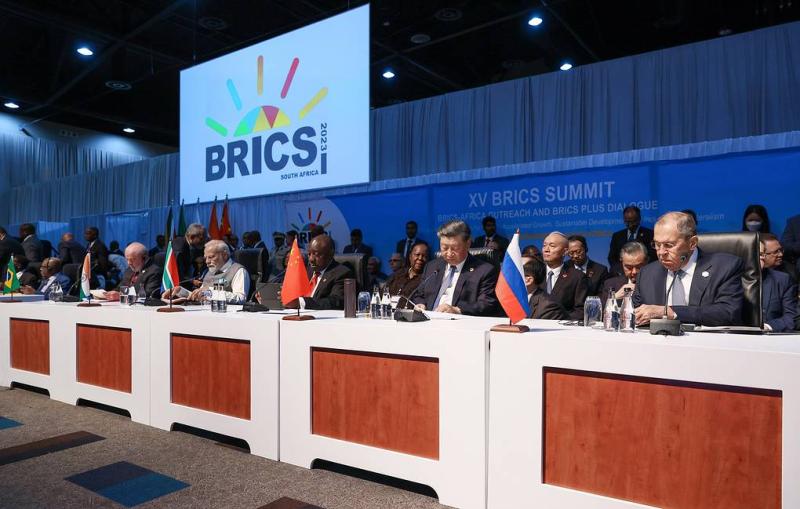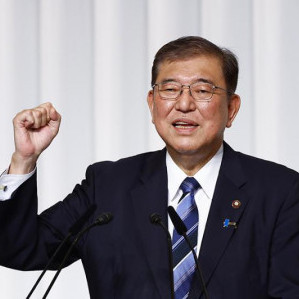
© Press Service of the Ministry of Foreign Affairs of the Russian Federation/TASS
Top stories from the Russian press on Friday, August 25th, prepared by TASS
BRICS enlists six new member countries from three continents to launch bloc’s expansion; the EAEU maps its future course; and Russia mulls withdrawing from the WTO. These stories topped Friday’s newspaper headlines across Russia.
Media: BRICS launches first stage of bloc’s expansion with six new members
On January 1, 2024, Saudi Arabia, the United Arab Emirates (UAE), Iran, Ethiopia, Egypt and Argentina will become full-fledged members of the BRICS, South African President Cyril Ramaphosa announced at the organization’s 15th summit in Johannesburg on August 24. "BRICS has embarked on a new chapter in its effort to build a world that is fair, a world that is just, a world that is also inclusive and prosperous," he asserted.
The rationale for bringing precisely these countries into the bloc, with the exception of Ethiopia, is attributable to what they each bring to the table in terms of economic and logistics advantages, Viktor Heifetz, professor at St. Petersburg State University and leading researcher at the Russian Academy of Sciences’ Institute of Latin American Studies, said. For example, the UAE is a regional financial hub, while Egypt offers logistics advantages via the Suez Canal and serves as a bridge between the Arab world and Africa. "They have different interests. Argentina needs loans, investments, it is interested in switching to payments in national currencies. The rest aspire to cooperate in the field of energy and build new logistics chains," the expert told Vedomosti.
The inclusion of new groups of countries in BRICS resulted from a compromise in talks between specific leaders, Fyodor Lukyanov, editor-in-chief of Russia in Global Affairs magazine, thinks. According to the expert, previously the organization had faced a choice between making a quantitative expansion or a qualitative reinforcement. "In the end, the forum’s participants chose the first option. This path, if it doesn’t block the second option, it substantially complicates it. Nevertheless, BRICS will gradually begin to transform into a different organization," the expert said in a conversation with Vedomosti, adding that they will have to do so because they cannot stop at only six randomly selected countries.
In a conversation with Nezavisimaya Gazeta, Alexander Lukin, research director of the Russian Academy of Sciences’ Institute of China and Contemporary Asia, noted: "It is incorrect to speak of some unsurmountable differences of opinion between the BRICS members. All members of the union will support a larger role for non-Western countries in the system of global governance. There are no differences of opinion among them on this issue. Russia will assume the chairmanship [for the next year] but this is a rotating, technical role. It won’t give [Moscow] any advantages. The more so as regards Ukraine, which is not part of BRICS and has nothing to do with it."
Vasily Kashin, director of the Center for Comprehensive European and International Studies at the Higher School of Economics (HSE University), told Nezavisimaya Gazeta that the countries that were admitted to BRICS were precisely those that the majority of members were interested in seeing in the organization. He also pointed out that the peace initiatives on Ukraine put forward by China and a group of African countries may bear fruit in the future if the situation on the battlefield changes.
Vedomosti: Russian prime minister urges EAEU to become self-sufficient macro-region
The prime ministers of the Eurasian Economic Union (EAEU) countries discussed the drafting of policy documents in Yerevan on August 24. These policies will largely affect whether the union will remain an exclusively trade organization or will gradually morph into an economic bloc. A session of the Supreme Eurasian Economic Council is slated for the year-end, when the union’s strategies covering up to the years 2030 and 2045 will be approved. Russian Prime Minister Mikhail Mishustin, speaking at a session of the intergovernmental council, said that the EAEU should finally become a "self-sufficient region."
The EAEU is a Russian project that provides access to the Russian market, resources and financial support, Andrey Suzdaltsev, associate professor at the Higher School of Economics (HSE University), commented. That said, however, when the Western-provoked sanctions war began, virtually all of the EAEU countries complied with the Western restrictions to varying degrees and made no moves or announcements to signal support for Russia, he added. However, to a certain extent they depend on Russia, so Moscow expects solidarity in return, the expert pointed out.
In his opinion, calls for transforming the EAEU into a self-sufficient macro-region are theoretically on the right track, but in practice this will only be possible if the member countries overcome their political fear of the consequences of violating Western sanctions. Additionally, Uzbekistan and Kyrgyzstan are currently leaning toward China and India, which is also an obstacle on the path to creating a single economic union with Russia, the expert thinks. According to Suzdaltsev, in order to resolve these issues it is necessary to unfreeze existing agreements, create a shared monetary space and develop a shared customs space.
A single payments space could be created on the basis of payments in the currencies of those countries with the maximum volume of mutual trade turnover, Denis Perepelitsa of the Plekhanov Russian University of Economics noted. For example, if Russia is the main exporter, then payments should be in rubles. In this situation, each country should create reserves in the Russian currency, he believes.
Izvestia: Russian State Duma lawmakers to discuss Russia’s withdrawal from WTO
The Russian State Duma may discuss a bill for withdrawing Russia from the World Trade Organization (WTO) during its upcoming fall session. The bill has been in the drafting stage in the lower house of parliament for about five years. According to the Communist Party of the Russian Federation (KPRF) faction, which is seeking a formal denunciation of the WTO agreement, the advantages of such a move include budget savings on membership fees as well as the opportunity to further develop trade relations within the Customs Union and the Eurasian Economic Union (EAEU). However, economists think that Moscow should not leave the WTO because, while it would have little impact on world trade, a withdrawal would translate into losses for Russia.
The WTO in general does not harm Russia in any way; it does not introduce separate restrictions against Moscow, nor does it voice support for the sanctions by its member states, Georgiy Ostapkovich, director of the Center for Business Trends Research at the Higher School of Economics (HSE University), said. This structure indeed assumes the position of the majority. However, Russia’s exit would not substantially impact world trade while it would affect Russia itself more sharply.
"Due to Russia potentially leaving the WTO, world trade will definitely feel a certain discomfort from the point of view, for example, of regulating raw materials commodities, but the thing is that Russia’s share in global GDP is about 2%. There will be a certain discomfort but that’s not a blow that could lead to some remarkable results for us. First and foremost, Russia will suffer losses because it won’t be able to take advantage of WTO benefits," the economist said.
In his opinion, overall, these days Russia having a seat at the table of this international venue is rather positive for Moscow because there are certain trade benefits that still can be gained from WTO membership.
Kommersant: Cancellation of Australian strike triggers drop in European gas prices
Gas prices in Europe plummeted by 25% over the past two days amid the news that employees of Australia’s Woodside Energy voted not to strike at its LNG plant. However, the labor union representing workers at two of Chevron’s Australian LNG plants has opted for a strike, which has not yet been scheduled. The beginning of the hurricane season in the US may also affect LNG deliveries. However, analysts do not expect a serious price hike in the short term.
Natalya Porokhova, head of Gazprombank’s Price Index Center, noted that weak demand in Europe and substantial gas supplies left over from the previous heating season, which helped in filling up underground storage facilities by 90% as early as August, remain as the key fundamental factors driving LNG prices worldwide.
That said, in the medium term, a deficit of capacities is expected in the LNG market, which is indicated by China and other Asian countries’ high level of activity in the long-term LNG contracts market in June-July, the expert pointed out.
AriCapital investment strategist Sergey Suverov also noted that Europe is approaching the heating season, so, despite 90%-full storage facilities, the price dynamics will largely depend on the weather because all other supply and demand factors are relatively stable. He stressed that a cold winter in the Northern hemisphere may boost LNG demand, which would directly affect European prices.
Vedomosti: China bans fish imports from Japan following Fukushima water dump
China’s General Administration of Customs has announced a ban on importing all seafood products from Japan due to the fact that, beginning on August 24, the Japanese authorities began discharging accumulated water used for cooling the Fukushima-1 Nuclear Power Plant (NPP) into the Pacific Ocean, the Xinhua news agency reported. Beijing also vowed to "dynamically adjust relevant regulating measures as necessary in order to prevent the threat of discharged water polluted with nuclear elements to human health and the safety of food products."
China’s ban on Japanese seafood and the general reaction to the water discharge are highly politicized, said Dmitry Streltsov, head of the Department of Asian Studies at Moscow State Institute of International Relations (MGIMO University). There has not been any precedent and it is impossible to forecast the exact consequences of Japan’s move, the expert stressed. The ban on importing Japanese seafood products to China will have some repercussions for the Japanese economy, but they are hardly likely to be catastrophic, Streltsov noted, saying that the export of seafood to China is not a priority segment of Japan’s economy while Beijing has repeatedly demonstrated the flexibility of its restrictions. Overall, Japan is very sensitive to the global reaction to its actions, but it will act in accordance with the opinion of influential Western scientists in the fields of radiation medicine, radiation security and safety, and ecology. Statements by politicians will not play any decisive role, the expert concluded.
China’s decision to ban imports is, above all, a reaction to the environmental threat created by Japan, thinks Andrey Karneyev, head of the Higher School of Economics’ (HSE University) School of Asian Studies. For many weeks, China has been objecting to Japan’s decision. It is not surprising that Beijing is expressing a high degree of displeasure because the consequences of the discharge of polluted water affect China directly, threatening its marine resources.









